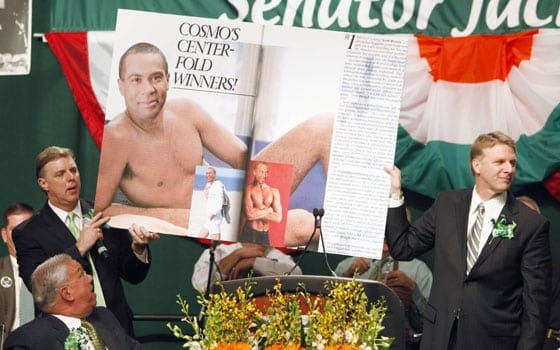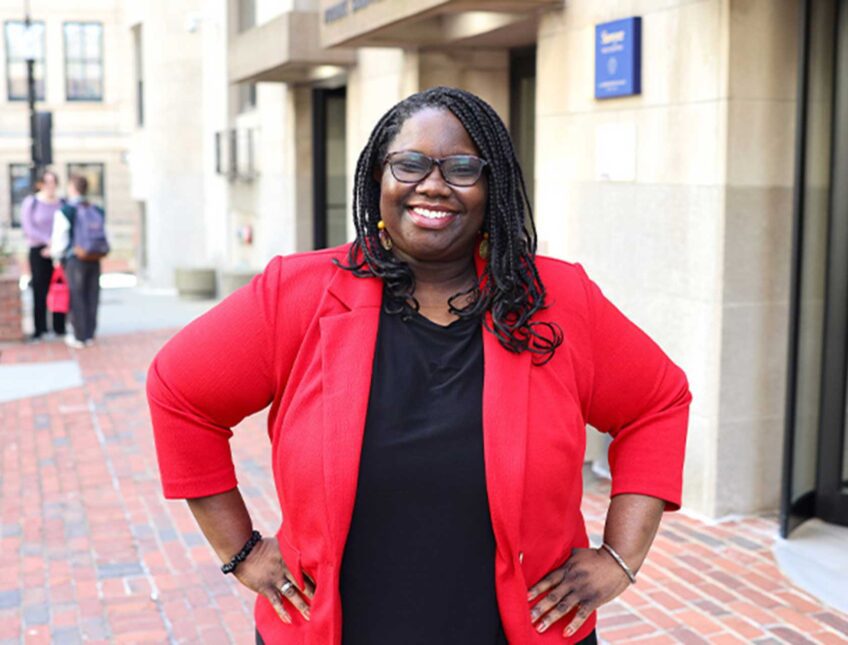

Author: AP /Michael DwyerMassachusetts state Treasurer Tim Cahill (r), who ran for governor, and state Sen. Jack Hart, D-Boston (l), held up a poster with the superimposed head of current Gov. Deval Patrick, as Boston Mayor Thomas M. Menino looked on at the annual St. Patrick’s breakfast in South Boston.
As part of next week’s National Urban League Conference, UMASS-Boston is scheduled to release its “State of Black Boston 2010 Report.” Sponsored by the Urban League of Eastern Massachusetts and the Boston branch of the NAACP, the report includes a section on Civic Engagement. Here is an excerpt.
At the annual St. Patrick’s Day roast of Boston politicians, the air was rife with discontent among the Democratic faithful. There was good reason. Little known state Sen. Scott Brown had just scored a stunning upset to claim the U.S. Senate seat left vacant by the death of Ted Kennedy.
Underneath the laughter and good-natured ribbing was the very real possibility that Deval Patrick, a close political ally of U.S. President Barack Obama, could lose the upcoming gubernatorial election. Some of the faithful doubted whether Patrick’s grassroots message of “Together we can” could overcome the global recession and its impact on the local economy. And some blacks were whispering that Patrick had not done enough to reduce the high black unemployment rate or increase diversity within state government.
But on this day, when scripted jokes were the traditional currency, Patrick had something else in mind during his turn at the podium.
After delivering a quick ba-da-bing punchline on the campaign’s three candidates — “tall, dark and handsome,” Patrick took direct aim at one of his two opponents: state treasurer Tim Cahill.
It was widely believed at the time that Cahill’s candidacy would siphon off votes from Republican candidate Charlie Baker and thus enable Patrick to squeak out a win.
In fact, and in keeping with the tradition of an Irish roast, state Senate President Therese Murray held up mock cover photos of the books several Massachusetts politicians were writing, including one by Patrick. “How I got re-elected” was the title, Murray quipped, and on the cover was a huge headshot of Cahill.
Given those strange politics, Patrick’s jab was a bit out-of-place and sounded more appropriate out on the campaign trail. But as far as Patrick was concerned, he was on the campaign trail. The state pension fund had lost millions under Cahill’s leadership, Patrick pointed out, and the state Lottery had never made its revenue goals since he began as governor in 2007.
“To be governor,” Patrick deadpanned in what he later explained as an unscripted line, “…at a minimum, you have to know how to count.”
The response from the audience of 700, many of whom where there to laugh, was immediate.
First a murmur, then silence.
Without a doubt, Patrick has made a lot of folks quiet. He can also count. His political appeal cut across all racial, ethnic and class lines in a state where Democrats outnumber Republicans by a three to one margin — 37 percent of registered voters are Democrats, 12 percent are Republicans and 51 percent are unaffiliated.
Not since 1966 when Republican Edward W. Brooke III became the first African American to be elected by popular vote to the U.S. Senate had an African American politician done as well in Massachusetts. But unlike Brooke’s landslide win that saw him earn 60.7 percent of the vote to Democratic Endicott Peabody’s 38.7 percent, Patrick won by the thinnest of margins.
In 2010, the margin was 147,417 votes. Patrick earned a total of 1,112,283 or about 48 percent. Baker came in second with 964,866 votes or 41 percent. Cahill pulled in 184,395 total votes — or more than the difference between Patrick and Baker. Given the state’s significant block of independent voters, no one can argue with any certainty that Cahill’s campaign vaulted Patrick back into the governor’s office — even factoring the nearly 40,000 votes earned by perennial Green party candidate Jill Stein. But it certainly helped.
Patrick’s win took on national implications — and established a new local standard. With the exception of Brooke, no other African American politician has had a predominantly white statewide constituency. While that suggests a transformation in white voter attitudes, it certainly has new ramifications for black voters, especially those more inclined to vote for candidates more outspoken on matters of race.
Like Brooke, Patrick did not make race an issue during his two campaigns, a fact that at least Brooke thought was the right strategy.
Asked what African Americans should expect from Patrick, Brooke replied: “I think they expect him to be a governor for all the people in Massachusetts, which includes African Americans, Hispanics and Caucasians. That’s all they can expect and hope for. If otherwise, he won’t be there long, nor should he be there long. That was what he was elected to do, to represent the people — all of the people.”
Beyond cynicism
Very few question Patrick’s “blackness.” But legitimate questions are raised on whether Patrick’s multi-billion dollar commitment to the state bio-tech and “green” industries will have a significant impact on minority neighborhoods plagued with poor academic performance and high crime. Others wonder what trickle down effect will be gained in Roxbury or Dorchester by giving state tax credits to Hollywood film crews.
To be sure, Patrick has done a better job of hiring and appointing blacks to the Statehouse, most notably Roderick Ireland, the state’s new Chief Justice of the Supreme Judicial Court, than previous administrations. He also maintained consistent funding to such long-standing education and social programs at Roxbury’s Freedom House and METCO. And Patrick readily admits he doesn’t do a good job of trumpeting his accomplishments in gaining passage of an ethics reform bill or adopting a new law revamping the state’s criminal record keeping system.
But despite such major local accomplishments, Patrick’s re-election was seen more as a repudiation of the national republican resurgence, not the result of Boston black political power. Against a backdrop of global economic recession and political uncertainty, it was the one affirmation to a disastrous referendum on the first two years of Obama’s presidency. Patrick’s win was all the more impressive in a state where blacks are only 5.4 percent of the population.
That Patrick led in the polls throughout the campaign over both Republican hopeful Baker and independent Cahill was no small matter either, particularly considering the noisy Tea Party Express movement that supported Brown and other conservative candidates across the country. Making things worse, the Republican Governors Association pumped $2 million in an advertising blitz to support Baker and paint Patrick as another tax-and-spend liberal in one of the nation’s bluest of states.
“Patrick has defied the laws of political gravity,” wrote the Boston Globe’s Brian Mooney. “Patrick was not a popular incumbent. But he was by far the more skillful candidate, and he ran the better campaign … When Baker failed to say where he would make specific program cuts in his drastic downsizing platform, Patrick filled in the blanks for voters, saying they would come in education, health care and aid to cities and towns.
As it turned out, Brown’s surprising win was the best thing to happen to Patrick. It forced him early on to secure his base of black and Latino voters, the ones that didn’t show up for state Attorney General Martha Coakley during her embarrassing campaign against Brown.
During that special election on Jan. 19, Coakley won the black vote in Boston — 94.9 percent in Ward 12 and 99.4 percent in Ward 14 — but the turnout was meager in the city’s two most minority voting districts. Only 34.9 percent of voters went to the polls in Ward 12 and 32.6 percent in Ward 14. The statewide turnout was 53 percent. “A greater turnout by blacks in Boston would not have won the day for Coakley,” opined the Bay State Banner, “but a more assertive campaign in minority areas across the state could have made a difference.
Out of 2,253,727 votes cast, Brown pulled 51.8 percent while Coakley earned 47 percent. Only a total of 107,317 votes separated the two.
Coakley should have known her support among African Americans was weak after the preliminary election. Blacks voted decisively for U.S. Rep. Michael Capuano. In Ward 12, Capuano had 50.4 percent of the vote compared to 29.2 percent for Coakley. In Ward 14, Capuano had 48.7 percent with 32.9 percent for Coakley.
Patrick did not make that mistake — nor did he take the black vote — or any vote — for granted. As he saw it, the biggest problem, regardless of race — was voter disenchantment. The acute frustration within black communities underscored the rise of cynicism across the state — and as seen in the Coakley election, all too often translated to voters staying home on Election Day. But he tapped into that political vein in a razor sharp and racially neutral way.
To that, Patrick was on point during a campaign stop at Suffolk University. “We are awash in cynicism in the Commonwealth, but the cynical are not smart; they’re just pretending to be,” Patrick said during his prepared remarks. “The truth is, we’ve got big problems, and we better start thinking big about the solutions. Ideological purity from the left or the right, in times like these, is like trying to put a Band-Aid on a broken bone.”
He added: “The chance to bring real and lasting reform for our schools, our economy and our communities is right in front of us. All that is missing is our willingness to put aside the tired, cynical habits of Massachusetts public discourse and get down to business.”
In his 2010 “State of the State Address,” delivered just two days after Brown’s U.S. Senate win, Patrick said he understood the anger among voters and non-voters alike. “Be angry,” Patrick said. “but channel it in a positive direction. It’s easy to be against something. It takes tough-mindedness and political courage to be for something.”
His story alone offered a clear example of what was possible — in spite of overwhelming odds. The 53-year-old married father of two daughters rose from childhood poverty, attended Massachusetts’ prestigious Milton Academy, Harvard College and Harvard Law on scholarship, and served in the Clinton administration Justice Department. After a corporate law career, he made his first bid for elective office in 2006 with the help of Chicago political consultants David Axelrod and David Plouffe, who would go on to run Obama’s 2008 presidential campaign.
Patrick didn’t need the job. But he became Massachusetts’ first African American to be elected governor in the state, the second in the United States since Reconstruction. “As a first time — and at first little known — candidate in 2006,” the Globe wrote, “… [Patrick] captured the states imagination by transforming mundane issued into big, bold themes with powerful emotional resonance.”
In seeking re-election, Patrick cast his campaign not as a quest for personal accomplishment, but as repayment for his free education. “I’m grateful, and all I’m trying to do is give back the same better chance that I got,” he said.
Challenges remain
At any other time or place, his story would be considered the most significant in the evolution of black politics in Boston. But this is not any other time or place. What is so problematic about proclaiming success to one notable achiever is that so many are still lagging behind in every economic indicator, including such long-standing problems as health and economic prosperity. To those problems seem a long-litany of government policies and nonprofit programs, but little new in actual results or changes in direction.
What has become increasingly part of the civic dialogue is the intractability of some of the city’s most chronic problems — black-on-black crime, low academic performance, high incarceration rates, low home and business ownership — and the seemingly impossibility of finding long-term, systematic solutions.
Its as if the headlines had not changed for the overwhelming majority of blacks in the last 75 years. In fact, the National Negro Congress (NNC) petitioned U.S. Congress in 1935 and bemoaned the status of blacks of the day.
In “A new crisis confronts the negro people,” the NNC wrote, “Today, the whole of the United States faces the crisis of mass unemployment, lower standards of living, hunger and misery. For Negroes this crisis shakes the foundation of their social and economic existence in the nation. For them six years of depression have meant an intolerable double exploitation both as Negroes and as workers …
“Even so-called negro jobs are no longer available,” the petition continued. “Unemployment spreads, and in ever section of the nation the Negro is fast becoming a jobless race.
The same could be written today. Complicating matters — at least in Boston — is not only finding common ground among Irish, Italians and Dominicans but also among Black Brahmins, transplanted southerners and immigrants from African and Caribbean nations. In Boston, the tens of thousands of new arrivals from Africa and the Caribbean have made possible the creation of service, advocacy or social organizations based on national origin, and, in the case of immigrant Africans, ethnicity or even home village. Low-powered radio stations, or dedicated radio or cable TV programs, speak for and to the black immigrant communities, sometimes in languages that native born blacks cannot comprehend, like Haitian creole.
Historically, city and state politics have provided a glue to bridge the ethnic, religious and class fault lines — as have civil rights organizations such as the Urban League of Eastern Massachusetts and the Boston chapter of the NAACP. But those community agencies and political offices have also found their influence dwindling, partly the result of low memberships, low voter turnouts and perceived ineffectiveness. The Black Church remains strong, but is divided over the issue of homosexuality, prompting a decline in leadership on broader civil rights issues such as gay marriage or public health policies aimed at reducing the spread of HIV/AIDS throughout minority communities.
The stakes are high. In Boston, as one analyst observed, the cost of disunity and disengagement can be seen in Brown’s U.S. Senate win. “For black immigrants, the republican’s win probably means the undocumented can forget about a path to U.S. citizenship or amnesty, which Brown opposes, anytime soon,” Pulitizer Prize-winning journalist Kenneth J. Cooper wrote in a recent edition of the Trotter Review. “That means fewer black voters in Boston, and perhaps a longer wait for a black mayor to finally move into City Hall.”






